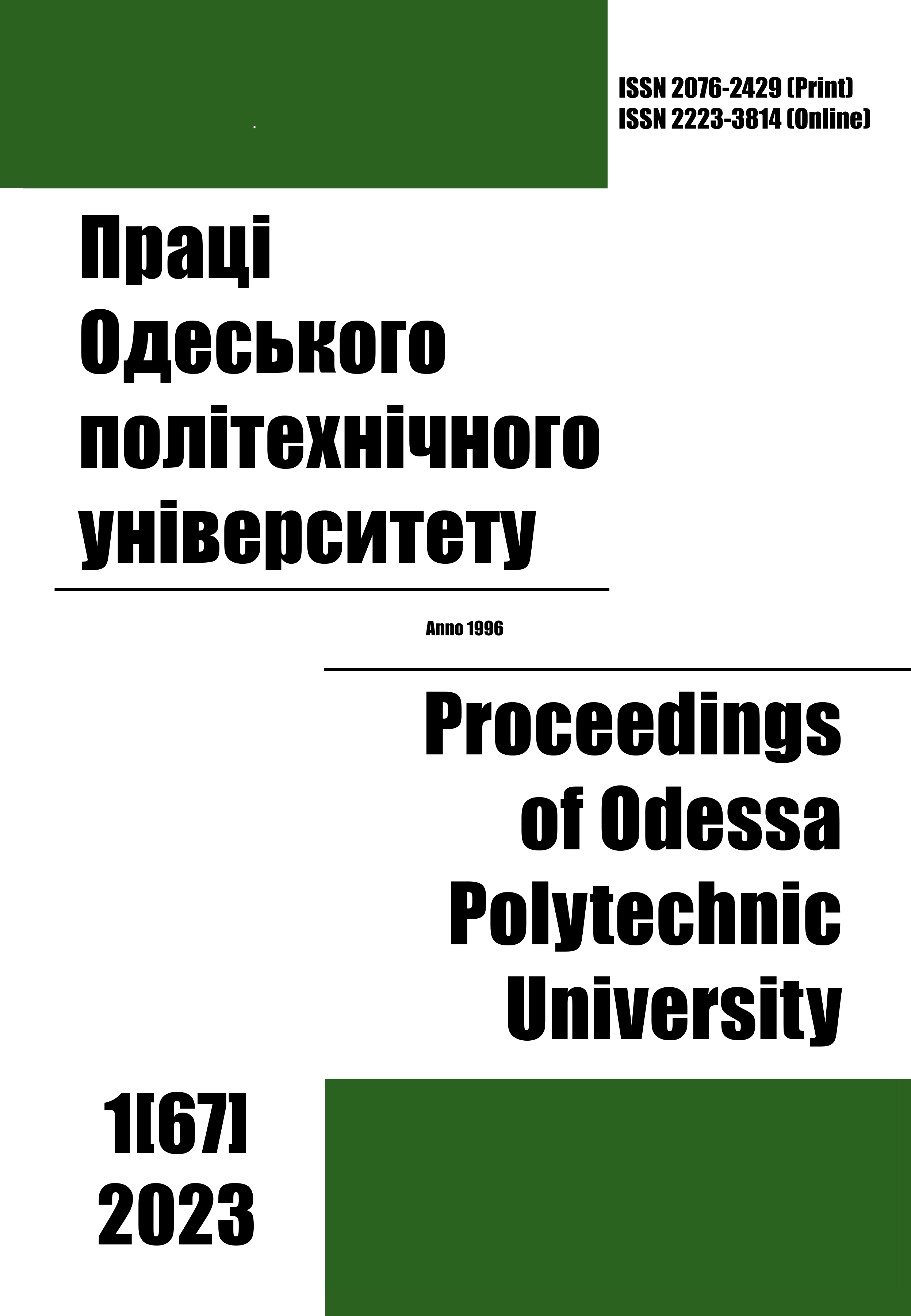Моделювання ефективності теплонасосної системи з баком-акумулятором для постійного та періодичного режимів роботи системи опалення громадських будівель
DOI:
https://doi.org/10.15276/opu.1.67.2023.05Ключові слова:
ефективність, тепловий насос, тепловий акумулятор, періодичний обігрів, модель енергетичного балансуАнотація
У статті розглянуто математичне моделювання ефективності комбінованих теплонасосних систем з накопиченням теплової енергії для періодичного опалення громадських будівель. Проаналізовано можливості комбінованої теплонасосної системи для роботи з традиційною системою опалення з урахуванням кліматичних умов, коли температура бівалентної точки визначає кількість енергії, що надходить від традиційного теплогенератора. Проведено чисельне моделювання процесів у системі комбінованого переривчастого опалення. Запропонована методологія аналізу може слугувати раціональним підходом до подальшого розвитку теплонасосних технологій періодичного опалення. Проведено оцінку ефективності режимів роботи системи короткочасного опалення за режимами роботи споживачів тепла. Запропонована методика сприяє підвищенню енергоефективності теплонасосних систем з баковими акумуляторами з урахуванням режимів роботи споживачів тепла. Результати моделювання включають коефіцієнт корисної дії та нагрівальну потужність. Виявлено режими роботи, коли значення коефіцієнта корисної дії були дуже високими. Аналіз результатів чисельного моделювання показує, що для теплонасосних систем з тепловим акумулятором відбувається вирівнювання кривої навантаження теплогенераторів, що призводить до рівномірної роботи джерела тепла. Конструкція технічних деталей теплового насоса була оптимізована з енергетичним балансом, який добре підходить для аналізу режимів роботи теплового насоса, інтегрованого з накопичувачем теплової енергії. Таким чином, розглядається раціональна тривалість короткочасних періодів опалення, коли тепловий насос працює з тепловим акумулятором, тривалість послідовного режиму опалення та режиму очікування з зарядкою теплового акумулятора, які позитивно впливають на енергоефективність. Згідно з результатами, додаткова новизна дозволяє оптимізувати технічні деталі та режими роботи комбінованої теплонасосної системи на частках відновлюваних джерел для постійного підвищення її енергоефективності. Математична модель, підтверджена експериментальними результатами, може бути використана для дослідження доцільності інтеграції бака-акумулятора в системи опалення теплового насоса з використанням відновлюваних джерел енергії.
Завантаження
Посилання
Industrial waste heat utilization for low temperature district heating / Hao Fang, Jianjun Xia, Kan Zhu, Yingbo Su, Yi Jiang. Energy Policy. 2013. vol. 62. P. 236–246. DOI: 10.1016/j.enpol.2013.06.104.
Qian H., Wang Y. Modeling the interactions between the performance of ground source heat pumps and soil temperature variations. Energy for Sustainable Development. 2014. vol. 23. P. 115–121. DOI: doi.org/10.1016/j.esd.2014.08.004.
Yang W., Sun L., Chen Y. Experimental investigations of the performance of a solar-ground source heat pump system operated in heating modes. Energy and Buildings. 2015. vol. 89. P. 97–111. DOI: doi.org/10.1016/j.enbuild.2015.08.006.
Sarbu I., Sebarchievici C. General review of ground-source heat pump systems for heating and cooling of buildings. Energy and Buildings. 2014. vol. 70. P. 441–454. DOI: doi.org/10.1016/j.enbuild.2013.11.068.
Warmenpumpen Testzentrum. Test Results of Air to Water Heat Pumps based on EN 14511. 2011. URL: http://www.ntb.ch/fileadmin/Institute/IES/pdf/PruefResLW110620_Eng.pdf.
Stuart J.S., Bale V.R., Marc A.R. Geothermal heat pump systems: Status review and comparison with other heating options. Applied Energy. 2013. vol. 101. P. 341–348. DOI: doi.org/10.1016/j.apenergy.2012.01.048.
Bayer P., Saner D., Belay S., Rybach L., Blum P. Greenhouse gas emission savings of ground source heat pump systems in Europe: A review. Renewable Sustainable Energy Reviews. 2012. vol. 16. P. 1256–1267. DOI: doi.org/10.1016/j.rser.2011.09.027.
Ruiz-Calvo F., Cervera-Vázquez J., Montagud C., Corberán J.M. Reference data sets for validating and analyzing GSHP system based on an eleven-year operation period. Geothermics. 2016. vol. 64. P. 538–550.
Alberto Liuzzo-Scorpo, Bo Nordell, Signhild Gehlin. Influence of regional groundwater flow on ground temperature around heat extraction boreholes. Geothermics. 2015. vol. 56. P. 119–127. DOI: doi.org/10.1016/j.geothermics.2015.04.002.
Hu P.F., Hu Q.S., Lin Y.L., Yang W., Xing L. Energy and exergy analysis of a ground source heat pump system for a public building in Wuhan, China under different control strategies. Energy and Buildings. 2017. vol. 152. P. 301–312. DOI: doi.org/10.1016/j.enbuild.2017.07.058.
. Rad F.M., Fung A.S., Leong W.H. Feasibility of combined solar thermal and ground source heat pump systems in cold climate, Canada. Energy and Buildings. 2013. vol. 61. P. 224–232. DOI: doi.org/10.1016/j.enbuild.2013.02.036.
Nguyen H.V., Law Y.L.E., Alavy M., Walsh P.R., Leong W.H., Dworkin S.B. An analysis of the factor- affecting hybrid ground-source heat pump installation potential in North America. Applied Energy. 2014. vol. 125. P. 28–38. DOI: doi.org/10.1016/j.apenergy.2014.03.044.
Zhijian Liu,Wei Xu, Cheng Qian, Xi Chen, Guangya Jin. Investigation on the feasibility and performance of ground source heat pump (GSHP) in three cities in cold climate zone, China. Renewable Energy. 2015. vol. 84. P. 89–96. DOI: doi.org/10.1016/j.renene.2015.06.019.
Wenxin Li, Xiangdong Li, Yong Wan, Jiyuan Tu. An integrated predictive model of the long-term performance of ground source heat pump (GSHP) systems. Energy and Buildings. 2018. vol. 159. P. 309–318. DOI: doi.org/10.1016/j.enbuild.2017.11.012.
Massimo Cimmino. Fluid and borehole wall temperature profiles in vertical geothermal boreholes with multiple U-tubes. Renewable Energy. 2016. vol. 96, part A. P. 137–147. DOI: doi.org/10.1016/j.renene.2016.04.067.
Nikola Kuzmic, Ying Lam E. Law, Seth B. Dworkin. Numerical heat transfer comparison study of hybrid and non-hybrid ground source heat pump systems. Applied Energy. 2016. vol. 165. P. 919–929. DOI: 10.1016/j.apenergy.2015.12.122.
Kojo Atta Aikins, Jong Min Choi. Current status of the performance of GSHP (ground source heat pump) units in the Republic of Korea. Energy. 2012. vol. 47. P. 77–82. DOI: doi.org/10.1016/j.energy.2012.05.048.
Liu, X.R. Analysis of heat balance and regional characteristics of ground-coupled heat pump systems. Heating, Ventilation and Air Condition. 2008. vol. 38. P. 57–59. DOI: doi.org/10.3969/j.issn.1002-8501.2008.09.014.
CO2-abatement cost of residential heat pumps with Active Demand Response : demand- and supply-side effects / D. Patteeuw, G. Reynders, K. Bruninx, C. Protopapadaki, E. Delarue, D. William, D. Saelens, and L. Helsen. Applied Energy. 2015. 156. 490¬501. DOI: 10.1016/j.apenergy.2015.07.038.
Mathiesen B.V., Lund H., Karlsson K. 100% Renewable energy systems, climate mitigation and economic growth. Appl. Energy. 2011. 88. 488–501.
Franco A., Salza P. Strategies for optimal penetration of intermittent renewables in complex energy systems based on techno-operational objectives. Renew. Energy. 2011. 36. 743–753.
Lund P.D., Lindgren J., Mikkola J., Salpakari J. Review of energy system flexibility measures to enable high levels of variable renewable electricity. Renew. Sustain. Energy Rev. 2015. 45. 785–807.
Reynders G., Lopes R.A., Marszal-Pomianowska A., Aelenei D., Martins J., Saelens D. Energy flexible buildings: An evaluation of definitions and quantification methodologies applied to thermal storage. Energy Build. 2018. 166. 372–390.
Samuels J.A., Grobbelaar S.S., Booysen M.J. Light-years apart: Energy usage by schools across the South African affluence divide. Energy Res Soc Sci. 2020. 70. 101692.
Geraldi M.S., Ghisi E. Mapping the energy usage in Brazilian public schools. Energy Build. 2020. 224. 110209.
Martinopoulos G., Kikidou V., Bozis D. Energy assessment of building physics principles in secondary education buildings. Energies. 2018. 11(11). 2929.
Kikidou V. Energy assessment of building physics principles in secondary education buildings. 2017. URL: https://repository.ihu.edu.gr/xmlui/handle/11544/29176.
Air Conditioners, Liquid Chilling Packages and Heat Pumps, with Electrically Driven Compressors, for Space Heating and Cooling. EN 14825. Testing and Rating at Part. Load Conditions and Calculation of Seasonal Performance. European Committee for Standardization (CEN). Brussels, Belgium, 2018. DOI: https://doi.org/10.1016/j.enbuild.2018.02.040.
Blarke M. B. Towards an intermittency‐friendly energy system: Comparing electric boilers and heat pumps in distributed cogeneration. Applied Energy. 2012. 91(1). 349–365. DOI: 10.1016/j.apenergy.2011.09.038.
Clean Energy Management Software platform RETScreen. URL: https://www.reeep.org/projects/retscreen-expert-decision-intelligence-software-platform.
Conti P., Bartoli C., Franco A., Testi D. Experimental analysis of an air heat pump for heating service using a hardware-in-the loop system. Energies. 2020. 13. 4498. DOI: 10.3390/en13174498.
Schito E., Conti P., Urbanucci L., Testi D. Multi-objective optimization of HVAC control in museum environment for artwork preservation, visitors’ thermal comfort and energy efficiency. Build. Environ. 2020. 180. 107018.
Saltelli A., Ratto M., Andres T., Campolongo F., Cariboni J., Gatelli D., Saisana M., Tarantola S. Global Sensitivity Analysis. The Prime, Editor Willey. GB, 2008, 305 p. URL: http://www.andreasaltelli.eu/file/repository/A_Saltelli_Marco_Ratto_Terry_Andres_Francesca_CampolongoJessica_Cariboni_Debora_Gatelli_Michaela_Saisana_Stefano_Tarantola_Global_Sensitivity_Analysis_The_Primer_Wiley_Interscience_2008_.pdf.
Klymchuk O., Denysova A., Balasanian G., Ivanova L., Bodiul O. Enhancing efficiency of using energy resources in heat supply systems of buildings with variable operation mode. Eureka. Physics and Engineering. 2020. (3). 59–68. DOI: https://doi.org/10.21303/2461-4262.2020.001252.





